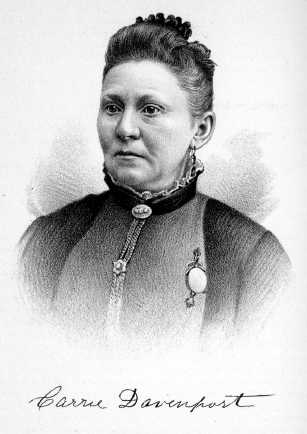and in pursuance of this business
traveled over considerable territory in the East, and
at the same time visited many manufacturing
establishments, where he obtained all the information
he possibly could concerning machinery and its
workings. He also at the same time realized the
importance of a home market, and proposed to a moneyed
friend that if the latter would build a cotton factory
he would furnish the land and water power, and add to
the enterprise a foundry. The proposal was accepted,
the machinery speedily put in operation, and from this
humble beginning the town of Colerain, Mass., sprang
into existence. Mr. Davenport having accomplished his
object, sold the foundry later for about what it cost
him, and in 1837, disposing of other interests in the
Bay State, removed to Hartford, Conn., and
establishing a nursery, began the propagation of a
vast number of mulberry trees, the natural food of the
silk worm, and which industry he believed might be
profitable. He sold a quantity of trees throughout the
country, and invested a portion of the proceeds in
valuable property in Connecticut, and land in some of
the Western States.
In 1870 Mr. Davenport found himself
a millionaire. He was also numbered among the leading
citizens of Hartford, whose endorsement on paper made
it acceptable at all the banks to any amount. He
subsequently met with reverses, and in 1888 retired
from active business. While a resident of Syracuse he
devoted 180 acres to the raising of cucumber seeds,
which brought him the snug sum of $4,700. Like his
wife, he is a man of large intellectual endowments,
and in earlier years there was scarcely a subject upon
which he could not converse intelligently.
Self-educated and well informed, he was alike at home
in the field of science, politics and religion, and
could hold his end of the argument with the most
learned professor. He was in the earlier days a member
of the old Whig party, but later endorses Republican
doctrines. He is now a strong Protectionist, and amply
able to give reasons for being so.
Mr. Davenport was for many years a
leading member of the Baptist Church at Hartford. In
addition to his other capacities he has given to the
world many useful inventions, possessing this genius
in a ratio equal to that of his gifted wife. Mr. and
Mrs. Davenport are a remarkable pair, and in this
respect one has been largely the assistant of the
other. We take pleasure in presenting the sketch of
Mrs. Davenport, as that of one of the first ladies of
Eastern Nebraska.

 ON.
J08EPH W. TALBOT is the proprietor of the elegant boot
and shoe emporium of Syracuse. He is a native of
Lockport, N.Y., and was born March 4, 1829. His
parents, Joseph and Harrah (Wilson) Talbot, were
natives of Vermont, but of English ancestry, their
parents having come from that country and made their
home in the Empire State. The father of our subject
was by occupation a farmer, and continued therein
until he had passed the prime of life, and then
engaged in the hotel business. He died in Batavia, N.
Y., in the year 1833. Subsequent to her bereavement
the mother of our subject emigrated with her children
to Barry County, Mich., and settled upon a farm, where
she eventually died, leaving ten children, all of whom
grew to the estate of man and womanhood, and their
names are recorded as follows: David, Mary, Lucy,
Joseph, Hannah, Sarah, Wealthy, George, Zilphia and
John B. The last four are deceased. ON.
J08EPH W. TALBOT is the proprietor of the elegant boot
and shoe emporium of Syracuse. He is a native of
Lockport, N.Y., and was born March 4, 1829. His
parents, Joseph and Harrah (Wilson) Talbot, were
natives of Vermont, but of English ancestry, their
parents having come from that country and made their
home in the Empire State. The father of our subject
was by occupation a farmer, and continued therein
until he had passed the prime of life, and then
engaged in the hotel business. He died in Batavia, N.
Y., in the year 1833. Subsequent to her bereavement
the mother of our subject emigrated with her children
to Barry County, Mich., and settled upon a farm, where
she eventually died, leaving ten children, all of whom
grew to the estate of man and womanhood, and their
names are recorded as follows: David, Mary, Lucy,
Joseph, Hannah, Sarah, Wealthy, George, Zilphia and
John B. The last four are deceased.
Our subject was but four years of
age when his father died and thirteen when the removal
was made to Michigan, where he grew to manhood. He
received a good, practical, English education in the
common schools, and was considered capable of
exchanging the scholar's desk for the teacher's, and
in this occupation he evinced considerable aptitude
and talent. In 1860 he removed to this State, and two
years later settled upon section 2, Syracuse Precinct,
where he owns 160 acres of excellent, arable land. He
was again occupied as a teacher, devoting his
attention to his farm when not thus engaged. Thus he
continued until 1882; by that time the children whom
he had instructed had grown up and had qualified
themselves for teaching, and he retired from the
profession. In 1885 Mr. Talbot established the store
which he has since continued with a largely increasing
patronage. The
|


